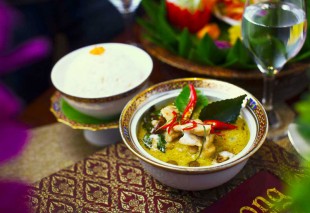

Cuisine focus: Thai

Have you noticed an increase in the popularity of Thai cuisine?
Steve Deconinck, executive chef, The Palace Downtown Dubai: The appeal of Thai cuisine has increased as Thailand’s reputation as a popular tourist destination becomes increasingly robust. Its cuisine is popular and diverse and appeals to everybody who loves a mixture of ingredients. Thai food is also flexible in the sense that you can adapt certain dishes to your own preferred level of spice.
Idin Asmitha, executive sous-chef at Eastern Mangroves Hotel & Spa by Anantara: Thai cuisine is known for its bold taste while being refreshing, light and spicy. The rich combination of flavours and spices achieve a balance of the five fundamental taste senses in a dish: spicy, sour, sweet, salty and bitter. It also offers various options of meat, seafood, noodle or vegetarian dishes, which other cuisines don’t necessarily bring to the table.
Nauremol Poolkuan, chef de cuisine, Benjarong: Thai cuisine has now become an internationally celebrated cuisine, attracting even the most finicky taste buds. Dusit Thani Dubai, in its own little ways, persists in showcasing authentic, royal Thai masterpieces which also include vegetable, fruit and ice carving, as well as live Thai musical entertainment.
Pang, Sabai Thai, The Westin Doha: We can see from a number of Thai restaurants both here in Doha and across the GCC, that there has been real growth in the number of Thai restaurants and the general availability of Thai food and ingredients. When you go shopping, many malls have areas providing fresh and dried Thai products. I think there is a real surge in demand for Thai cuisine which is very exciting to see.
What is the latest trend in Thai cuisine?
Poolkuan: The ‘delivery revolution’. Convenience in a fast-paced city such as Dubai has become a norm and recently, even fine-dining Thai restaurants have embraced this trend. Benjarong, for example, has partnered with Deliveroo, a food delivery service provider. This huge step gives you a royal Thai experience in your home.
Asmitha: As in other types of cuisine, a need for more health conscious options can be observed in Thai cuisine, such as gluten-free and vegetarian options.
Deconinck: The latest trend in Thai cuisine is to combine sweet and sour with organic dishes to make delicious combinations.
Pang: Currently, there is a real interest in local food, with people bringing out special dishes from their hometowns and sharing them more widely. That localised approach is something we at Sabai Thai are keen to develop as well — and we are paying more attention to the origin of ingredients that people don’t usually use.
What challenges do you face, if any, when it comes to Thai cuisine?
Poolkuan: With the sprawling rise of Thai restaurants in a multicultural city, it is a challenge to educate diners in differentiating authentic, proper royal Thai cuisine from fusion and modern approaches.
Asmitha: The biggest challenge we are facing when it comes to Thai cuisine is the supply of fresh Thai products and especially their short shelf life.
Deconinck: The challenge facing modern-day Thai food is to stay as authentic as possible — this is the attraction of the cuisine. However, the drive towards moving away from authentic and attempting to apply something non-traditional presents itself as an obstacle.
Pang: The general crowd of people who might not travel or who do not have a background in gastronomy have a completely different idea of what Thai food is. So, the perception is still different from the reality in many ways. People apply the same rules to all restaurants, and if we label ourselves as a fine-dining restaurant, then people have a certain perception and use Western standards to apply it to our food, which does not work — like people ask for table salt to season their food, but that’s not really needed in Thai cuisine.
Do you rely on importing ingredients or are local products used?
Poolkuan: Benjarong believes in ensuring the use of high quality ingredients and takes its commitment seriously by importing these ingredients from Thailand on a weekly basis.
Asmitha: Most of the essential ingredients are imported from Thailand such as curry paste, coconut milk, Thai mango and Thai fresh herbs like lemon grass, galangal, Thai sweet basils and betel leaves.
Deconinck: Given the difference in weather and climate between Dubai and Thailand, we have to import particular Thai products to ensure that we match the expectations of our customers.
Pang: A cuisine’s success depends on the quality of its ingredients. Once you have the right quality ingredients, there is no limit to what you can achieve. We source locally when we can, however, it’s simply not going to get the right balance of taste and texture if we miss even one ingredient, which is why we have to rely on importing many of our ingredients. Ingredients like duck egg, fresh jasmine flower, pure palm sugar and fresh coconut cream are very difficult to source locally.